|
|
|
Sort Order |
|
|
|
Items / Page
|
|
|
|
|
|
|
| Srl | Item |
| 1 |
ID:
086661
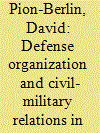

|
|
|
|
|
| Publication |
2009.
|
| Summary/Abstract |
This study examines how defense institutions and personnel are formally organized in Latin America. In a region long plagued by praetorian armies, it is especially important that organizational designs ensure that civilians maintain institutional control over armed forces. For this to occur, it is argued that those designs must incorporate certain principles: (a) enhance the civilian presence in key defense institutions, (b) empower defense ministries, (c) lower the military's vertical authority along the chain of command, and (d) unify civilian power while dividing military power. Based on an examination of legal documents and other data for sixteen Latin American democracies, findings show three general organizational patterns: an ideal-typical defense structure that achieves all four objectives, a second best defense structure that still leaves too much military power unified, and a dual command structure that is least desirable for weakening the defense ministry while coalescing military might high up the ladder of influence.
|
|
|
|
|
|
|
|
|
|
|
|
|
|
|
|
| 2 |
ID:
188246
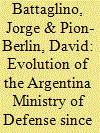

|
|
|
|
|
| Summary/Abstract |
Through a progressive strengthening of organizational, legal, and personnel attributes, Argentina's Ministry of Defense has become civilianized. The MOD has been strengthened by the addition of new bureaucratic units headed by civilians with the authority to shape and conduct defense policy while also encouraging interactions with military personnel, resulting in better informed policy choices. This article will account for these changes through a detailed analysis of foreign affairs, strategic planning and promotions, production and research, and education. Procedural rules, divisions of labor and civil-military interactions are delineated. Military modernization deficiencies and the need for a permanent civilian staff are noted.
|
|
|
|
|
|
|
|
|
|
|
|
|
|
|
|
| 3 |
ID:
188248
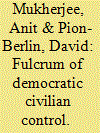

|
|
|
|
|
| Summary/Abstract |
In this introduction we present the justification and the analytical frame of our special issue. More specifically, this issue examines the institutional role of defence ministries in fortifying civilian control and military effectiveness. As we argue, scholarship on this subject is sparse, despite the ministry’s importance in enforcing civilian control, enhancing military effectiveness, and conducting the day-to-day affairs of national defense. If defence ministries are to fulfill these obligations, they must be properly positioned, financially and bureaucratically endowed, as well as staffed with knowledgeable civilians with sufficient authority. Not all ministries are up to these standards. To highlight these aspects, our special issue examines the defense ministries of four countries, two of which are older democracies (France and India) and two more recently established ones (Argentina and South Korea). These case studies pay particular attention to organizational design of the ministries, the roles assigned to civilian and military personnel, how much defense expertise civilians and officers can claim, and whether there are mechanisms that allow ministry personnel to convert resources into military strength. We underscore our contribution to the literature and suggest avenues for further research.
|
|
|
|
|
|
|
|
|
|
|
|
|
|
|
|
| 4 |
ID:
094816
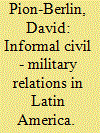

|
|
|
|
|
| Publication |
2010.
|
| Summary/Abstract |
This study examines the phenomenon of informal civil-military relations. Informal behaviors are those that normally do not occur within the chain of command, are not mandated by law, and do not conform to official procedures. Politicians and soldiers discover that formal, institutional routines are sometimes too constraining and that they can advance their interests more effectively by amending, circumventing, or violating those routines. The party most aggrieved by the rules of the game initiates an informal solution. Whether the other side goes along depends on how divergent its preferences are with the aggrieved party. Greatly divergent preferences result in unilateral informalities, less divergent but still negotiable positions yield bilateral-conflictive encounters, and convergent preferences result in cooperative ventures. Case studies on Chile, Argentina, and Bolivia exemplify three different kinds of informal encounters and their impacts on civilian policy choices and military interests.
|
|
|
|
|
|
|
|
|
|
|
|
|
|
|
|
| 5 |
ID:
151014
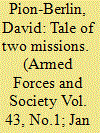

|
|
|
|
|
| Summary/Abstract |
Latin American scholars often maintain that militaries should be kept out of internal security operations. Soldiers, they claim, are ill suited for these assignments, inevitably placing innocent civilians in harm’s way. This study instead argues that not all counternarcotic missions are the same. When a specific operation coincides with a military’s capabilities and proclivities, it can be conducted effectively and humanely. When there is a disconnect between the operation and the institution, there is a greater chance for mission failure and civilian casualties. Those differences are revealed in a comparative case study of the Mexican military’s crime patrols versus its targeted operations against cartel kingpins. It finds that while there are justifiable doubts about transforming soldiers into cops, it is also the case that soldiers can conduct themselves professionally and with restraint when they are tasked with assignments that conform more closely to their skills sets.
|
|
|
|
|
|
|
|
|
|
|
|
|
|
|
|
| 6 |
ID:
105689
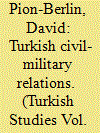

|
|
|
|
|
| Publication |
2011.
|
| Summary/Abstract |
This article compares civil-military relations in Turkey and Latin America. It finds that in both cases, military interruptions of democratic rule have been justified on grounds of military guardianship over national values and interests and feelings of professional superiority over civilians. It also finds that while the Turkish military ruled for brief periods, relying instead on extracting legal constitutional guarantees to maintain influence, Latin American militaries ruled for lengthier periods with less constitutional rewriting. In recent years, militaries in both places seem more willing to accept civilian policies even if they disagree with them.
|
|
|
|
|
|
|
|
|
|
|
|
|
|
|
|
|
|
|
|
|